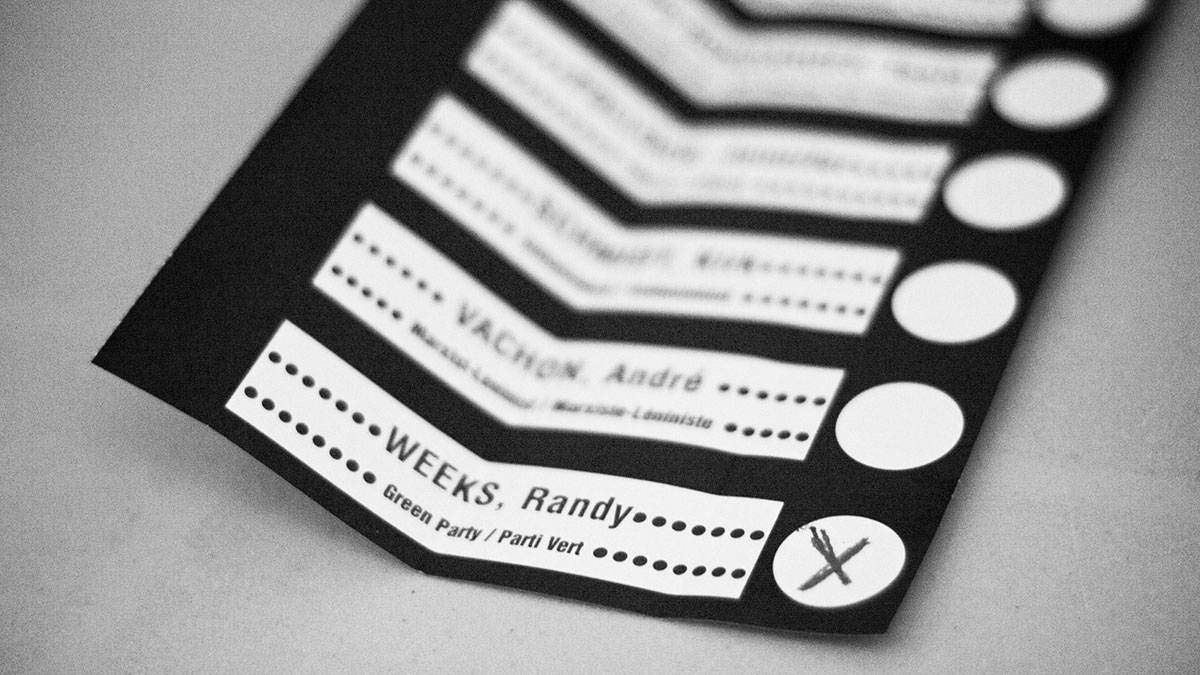Editorial: Direct democracy grants autonomy
 Christina Varvis
Christina VarvisCanadians across the country are getting ready to experience something that only happens every few years: democracy.
Soon, we can all head to the polls and choose which of the four — ok, let’s face it, only three of them have a shot — candidates we want to have decide our country’s fate. During the election, these candidates will promise to represent us well in Ottawa. Once they’re actually there, they’ll fall in line with the rest of their party which will vote as one big block on whatever issue comes up.
That’s representative democracy, and that’s how it works in most democratic countries around the world. All decisions ultimately come down to what the 338 members of parliament decide. That’s about 100,000 citizens to each MP, although it depends on the riding. Yes, citizens can present petitions and calls for action to their representatives. Yes, they can protest for their causes, gather their friends, and write their MPs, but it’s all pointless if a representative isn’t willing to vote against their party.
I’m fortunate to hold dual-citizenship in Canada and Switzerland and I’ve participated in both political systems. Switzerland is the closest thing the world has to direct democracy, and laws passed by parliament may be challenged by any citizen. If they gather 50,000 signatures, the law is put to referendum. Similarly, if a citizen wants to introduce an amendment to the Constitution, they need to gather 100,000 signatures to start a referendum. The government may also offer a middle-ground counter-proposal, which is voted on the same day as the citizen-proposed one.
There are some common arguments against direct democracy. Those that wouldn’t trust their fellow citizens to make decisions are terrified of it. I would argue that this is undemocratic thinking, and that the Swiss system’s addition of some representative democracy adds checks and balances to both branches to make sure power isn’t being misused. Some argue that direct democracy isn’t possible with a large population, but this is also not an issue. I get letters with codes to vote online in Swiss referendums, so it wouldn’t be that farfetched to make an entirely digital voting system. The campaigning parties are making much more expensive proposals than that.
Realistically, Canada isn’t moving to a direct democracy anytime soon. Instead of voting for issues, we’ll continue to vote for bundles of issues represented by parties. I’ve looked at all of the major parties, and a few of the minor ones, and there isn’t a single one that I agree on all points with. Every online vote compass and political party picker tells me I like the NDP and Liberals about 60 per cent, the Conservatives about 40 per cent and the rest don’t matter anyway. It reminds me of the Conservative omnibus budgets many people were against, where small, unrelated laws were snuck in.
The only way I can see representative democracy actually working is if our representatives were to actually represent us. Unfortunately, the concept of party discipline, and with that free votes and party whips, go against the way it should work. Our representatives should be gathering data on how people want them to vote, even if it goes against the party line. Then again, instead of having representatives polling their constituents and having the option to ignore them, we may as well have some form of direct democracy.
One argument against direct democracy is that we can’t trust Canadians to make the right decisions. But can we really trust politicians? There are constant scandals not only in Ottawa, but closer to home, too. And while we’re quick to blame Harper for the federal ones, does anyone else remember the sponsorship scandal which destroyed our former Liberal government’s support in the first place? Corruption isn’t something we can get rid of by switching out one set of politicians for another. We also can’t get rid of it by changing the system, but at least citizens would have more autonomy under direct democracy.
Even our own Students’ Union isn’t free from scandal. Last year’s SU elections were fraught with problems, from disqualifications to revotes, vote tampering to straight-up intimidation. It’s not something we expect to see at the university level, especially not from people that have likely wanted to be in politics their whole lives. These are the people who will one day rise up the ranks of politics to represent us commoners. If this is how they’re starting, is it any wonder we have Duffys, Wrights, and Redfords?
I was recently invited to the Students’ Union’s Get Out the Vote Facebook event and it made me laugh. It reminded me of how little I actually care about voting in this election. I live in Edmonton Strathcona, where it’s obvious that the NDP will win. I may like them a whopping 60 per cent according to the internet, but that doesn’t inspire me to elect them to run our country. It doesn’t matter, though, because even if we don’t have direct democracy, we also don’t have proportional representation. I already know without a doubt who’s going to win and I don’t have a better alternative. I might as well not waste my time, stay at home, and write about things I have no control over in The Gateway.





“I get letters with codes to vote online in Swiss referendums, so it wouldn’t be that farfetched to make an entirely digital voting system.”
Comments like this drive me nuts. The absolute best part of our current voting system is the fact that we vote *on paper*. Why? At the very least, it is completely possible to do a recount and to store the votes to be examined again if needed. No one has been able to design an online system that can’t be hacked. And with an electronic system, how do you know that your vote got recorded the way you said you submitted it? All you need is a little piece of coding changing every 3rd vote for Party A to Party B to control an election.
It’s really easy to write code that says one thing to the front end user and does something completely different on the back end. Just because the machine says it registered your vote as for Party A, it doesn’t mean that’s what it’s doing somewhere else.
Yes, online voting may be easier. But people who are apathetic about their vote (as the writer of this piece) won’t vote just because it’s online. Let’s focus on changes that will improve our democracy not potentially sell it to whoever hires the best hacker.
I disagree that you shouldn’t vote just because you already “know” who’s going to win. If you care about political issues, at least exercise your right to politely decline to vote – this sends a message in itself. I’ve been fighting for the right to vote for 4 years, in both Federal and Provincial elections, as I’m still not considered a Canadian citizen!
The fact that other young students are doing something to encourage young citizens to vote is commendable. Campaigns like Get Out the Vote may not be perfect, but they’re a start to creating a better dialogue among students who should care about political issues.